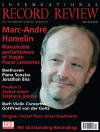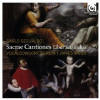Texte paru dans: / Appeared in:
*

International Record Review - (04/2013)
Pour
s'abonner / Subscription information
Harmonia Mundi
HMC902123

3149020212325 (ID294)
Consultez toutes les évaluations recensées pour ce cd
~~~~ Reach all the evaluations located for this CD
Successive generations (and Philip Heseltine/ Peter Warlock has to take his fair share of the blame for this) have become so fixated on Carlo Gesualdo’s non-musical antics that mention of him usually casts his music as an irrelevant aside. But while the story of a manic aristocrat who indulged in ultimately fatal self-flagellation, murdered his wife and his wife’s lover (caught in flagrante delicto), had what he believed to be their illegitimate child ‘rocked to death while his musicians sang madrigals about the beauty of death’ (to quote from a paper published in 2010 by James Wood), indulged in unsavoury sexual practices and got himself lied up with pagan witchcraft rites (according to another Gesualdo expert, Glenn Watkins) does make for stimulating reading, his music should, in the normal course of events, be sufficient to ensure his name remains high in public consciousness. Certainly, the fact that he has gone down in history as a nasty piece of work should not blind us to his supreme gifts as a musician; after all, if creators of great music had to be decent human beings as well, that would pretty well exclude Bach, Mozart, Beethoven and, especially, Wagner (to name just four). Yet the attempts of those who recognize his musical qualities — Stravinsky and Peter Maxwell Davis being among his more high-profile advocates have often tended to flounder on the shores of scandal. We can only hope that James Wood has more success.
Wood is so convinced of Gesualdo’s musical greatness that he has devoted years to the reconstruction of the second volume of Sacrae Cantiones, which, as he points out in his excellent booklet note with this recording of the finished result, constitutes one third of Gesualdo’s entire output of sacred music. The two books of Sacrae Cantiones were published in 1603, but while the first, for five voices, has survived complete and can be heard on a very fine Naxos recording from Jeremy Summerly and his Oxford Camerata (8.550742) two of the part-books (Bassus and Sextus) from the second book, for six and seven voices, have been lost. It took Wood three years, from 2008-11, to achieve his very successful reconstruction, and he has described the task as ‘a massive crossword puzzle, where each point of imitation must follow a set of “rules” in order to make grammatical sense’ . The results are here displayed in this first recording of the complete Second Book, although three of 20 individual pieces which constitute the Second Volume (Da pacem Domine, Assumpta est Maria and Illumina nos were not so much completed as radically recomposed by Stravinsky) are reasonably well represented in the record catalogues.
Vocalconsort Berlin presents clear and unfussy performances made in the dry acoustic of a Berlin studio. The crystal-clear sound, lacking the atmosphere we usually expect in a recording of sacred choral music, nevertheless casts a sharp focus on every nuance of Gesualdo’s (and occasionally Woods’s) writing. Framed by two motets from the 1611 Responsoria the 20 individual pieces of the second volume of Sacrae Cantiones are here performed not in numerical sequence but thematically. The immediacy of the recorded sound certainly allows for Gesualdo’s complex chromatic lines to be easily traced - one of the more absorbing being O anima sanctissima, one of three pieces lumped together on this recording under the title ‘Despair and Weeping’, while the harmonically labyrinthine Ne derelinquas me is one of the more fascinating pieces within the grouping ‘Peace and Hope’.
That this music is being heard largely for the first time in 400 years is remarkable enough; that it is presented with such precision and clarity by performers who are clearly committed to it through having the co-creator directing them, is a distinct bonus. Hopefully such assured and intense performances will help establish the posthumous reputation of Carlo Gesualdo as a successful composer rather than as a murderer, philanderer and moral deviant.
Cliquez l'un ou l'autre
bouton pour découvrir bien d'autres critiques de CD
Click either button for many other reviews


